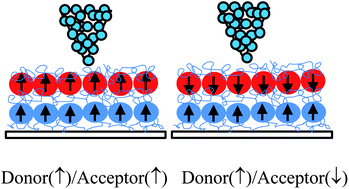Molecular rectifiers based on donor/acceptor assemblies: effect of orientation of the components' magnetic moments
Abstract
In forming donor/acceptor assemblies that act as molecular rectifiers, we have introduced magnetic

* Corresponding authors
a
Indian Association for the Cultivation of Science, Department of Solid State Physics, Jadavpur, Kolkata, West Bengal, India
E-mail:
sspab4@iacs.res.in
Fax: +91-33-24732805
Tel: +91-33-24734971
In forming donor/acceptor assemblies that act as molecular rectifiers, we have introduced magnetic

 Please wait while we load your content...
Something went wrong. Try again?
Please wait while we load your content...
Something went wrong. Try again?
A. Bera and A. J. Pal, Nanoscale, 2013, 5, 6518 DOI: 10.1039/C3NR00493G
To request permission to reproduce material from this article, please go to the Copyright Clearance Center request page.
If you are an author contributing to an RSC publication, you do not need to request permission provided correct acknowledgement is given.
If you are the author of this article, you do not need to request permission to reproduce figures and diagrams provided correct acknowledgement is given. If you want to reproduce the whole article in a third-party publication (excluding your thesis/dissertation for which permission is not required) please go to the Copyright Clearance Center request page.
Read more about how to correctly acknowledge RSC content.
 Fetching data from CrossRef.
Fetching data from CrossRef.
This may take some time to load.
Loading related content
